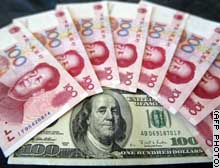|
Dick Cheney's Banker Grantham Sees World Bubble
by William Pesek via rialator - Bloomberg.com Thursday, May 3 2007, 10:32pm
wpesek@bloomberg.net
international /
social/political /
other press
May 2 (Bloomberg) -- You'd expect someone whom the famously dour Dick Cheney entrusts with millions of his dollars might have a gloomy view of the world. Jeremy Grantham does indeed.
"From Indian antiquities to modern Chinese art; from land in Panama to Mayfair; from forestry, infrastructure and the junkiest bonds to mundane blue chips -- it's bubble time,'' he writes in Grantham, Mayo, Van Otterloo & Co.'s latest quarterly letter titled, "The First Truly Global Bubble.''

Paper money reverts to paper
Grantham, 68, is chairman of the Boston-based company that, according to financial disclosure reports, in 2005 managed as much as $6.1 million for U.S. Vice President Cheney. And if his own recent actions are any guide, he's quite the multitasker.
The money manager is a critic of the U.S. energy policies for which Cheney bears considerable responsibility. In February, Grantham donated $23.6 million to Imperial College London to establish an institute on climate change.
Perhaps these multitasking skills helped Grantham make one of the gutsiest market calls in recent memory: That pretty much every asset class, everywhere, is in the midst of a bubble.
It would be comforting if we could dismiss such negativity. After all, isn't the Dow Jones Industrial Average climbing to all time highs at a time when Japan and Europe are growing, China, India and much of the rest of Asia boom and all's well in the global financial system?
Sure, and that's just what worries Grantham. He points to the U.S. in the late 1990s and Japan in the late 1980s -- periods when investors thought asset rallies would continue indefinitely.
"Most bubbles, like Internet stocks and Japanese land, go through an exponential phase before breaking, usually short in time, but dramatic in extent,'' Grantham argues, and he has a point.
Bubbles Everywhere
Bubbles generally require two dynamics: the perception of near-perfect economic conditions and an abundance of cheap credit.
The Bank of Japan left its overnight lending rate at 0.50 percent last week, giving traders a green light to put on more "yen-carry trades.'' Borrowing cheaply in yen and moving those funds into higher-returning assets overseas has been a one-way bet and markets have little reason to think that'll change. China's unprecedented buildup of currency reserves -- $1 trillion and counting -- also may constitute a bubble of sorts.
The amount of liquidity zooming around the globe has Grantham wondering if risk is really as negligible as many investors seem to think.
"Sustained strong fundamentals and sustained easy credit go one better: they allow for continued reinforcement,'' Grantham argues. "The more leverage you take, the better you do. The better you do, the more leverage you take.''
China's Gold Rush
Looked at from that perspective, perhaps China's wacky stock rally isn't so disconnected from the world after all. Modern history offers few better examples of a Ponzi scheme than Chinese shares. The CSI 300 Index, which tracks yuan-denominated A shares listed on the Shanghai and Shenzhen stock exchanges, gained 75 percent already this year and has tripled in the past 12 months.
In that time, China's fundamentals changed little. It's still growing faster than 10 percent; officials in Beijing still can't figure out how to slow things down; a lack of transparency still makes it hard to know what's going on in corporate boardrooms; and Asia's No. 2 economy still faces risks of overheating, pollution, social unrest and trade wars.
All that's changed is the amount of attention paid to Chinese stocks, creating a gold rush. It's akin to the media attention lavished on dot-com day traders in the late 1990s. Newcomers armed with get-rich-quick dreams, not economic realities, are propelling shares higher.
This IS Different
A similar dynamic may be playing out across the global economy. Everyone, as Nouriel Roubini, chairman of Roubini Global Economics in New York, has been warning, is reading about how great things are and throwing caution to the wind. It's more titillating to read about hedge fund managers making over $1 billion a year than about global imbalances.
What makes today's global financial boom different is that it really is, well, different. Past bubbles came amid lofty claims of new eras. In the 1980s, the new era featured a Japanese business model many said couldn't go wrong. In the 1990s, the U.S. was awash with similar hubris.
"This time, everyone, everywhere is reinforcing one another,'' Grantham argues. "Wherever you travel, you hear it confirmed that `they don't make any more land,' and that `with these growth rates and low interest rates, equity markets can keep rising,' and `private equity will continue to drive the markets.' To say the least, there has never been anything like the uniformity of this reinforcement.''
New, New Era
Markets' success in withstanding September's $6.6 billion implosion of Amaranth Advisors LLC and more recent turmoil among subprime mortgage lenders prompted talk of another new era. This latest one seems centered on China producing infinite amounts of cheap labor, U.S. deficits being sustainable, major economies growing in sync and deep, diversified markets being able to multitask whatever comes their way.
The trouble, Grantham says, is that the bursting of this bubble "will be across all countries and all assets, with the probable exception of high-grade bonds. Risk premiums in particular will widen. Since no similar global event has occurred before, the stresses to the system are likely to be unexpected.''
Good luck multitasking that.
William Pesek is a Bloomberg News columnist. The opinions expressed are his own.
© 2007 Bloomberg
http://www.bloomberg.com/apps/news?pid=20601039&sid=axjQJ8._t2Dk&refer=home
<< back to stories
|